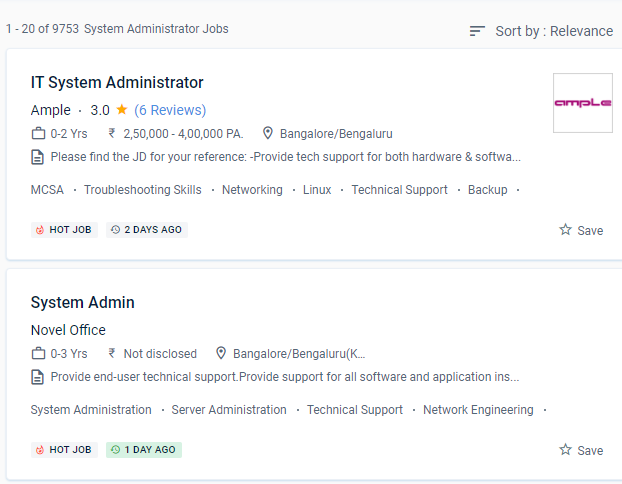System Administration Internship/Course Details


They are IT-savvy and can troubleshoot any technical issues that are causing the system to malfunction. You'll also learn how to manage and configure servers, as well as how to manage PCs, user information, and user productivity using industry tools. These experts may go on to become technology and IT managers in the future.
They install computers, laptops, intranets, servers, cybersecurity software, and other technology.
To digitally connect clusters of computers, they create local area networks (LANs) and wide-area networks (WANs).
System administration roles are broad and often vary based on the type of computer system being managed, however, the majority of them have some fundamental functions that can be accomplished in a variety of ways. You now understand what system administration entails, as well as the functions that system administrators execute and the talents that system administrators possess.
A system administrator's responsibilities include the following:
System administrators are in charge of managing, maintaining, and configuring commercial computer systems on a day-to-day basis. Finally, you'll discover how to restore your company's IT infrastructure following a disaster. Network architects have frequently experienced administrators who build data transmission systems from the ground up.






 They are IT-savvy and can troubleshoot any technical issues that are causing the system to malfunction. You'll also learn how to manage and configure servers, as well as how to manage PCs, user information, and user productivity using industry tools. These experts may go on to become technology and IT managers in the future.
They install computers, laptops, intranets, servers, cybersecurity software, and other technology.
To digitally connect clusters of computers, they create local area networks (LANs) and wide-area networks (WANs).
System administration roles are broad and often vary based on the type of computer system being managed, however, the majority of them have some fundamental functions that can be accomplished in a variety of ways. You now understand what system administration entails, as well as the functions that system administrators execute and the talents that system administrators possess.
A system administrator's responsibilities include the following:
System administrators are in charge of managing, maintaining, and configuring commercial computer systems on a day-to-day basis. Finally, you'll discover how to restore your company's IT infrastructure following a disaster. Network architects have frequently experienced administrators who build data transmission systems from the ground up.
They are IT-savvy and can troubleshoot any technical issues that are causing the system to malfunction. You'll also learn how to manage and configure servers, as well as how to manage PCs, user information, and user productivity using industry tools. These experts may go on to become technology and IT managers in the future.
They install computers, laptops, intranets, servers, cybersecurity software, and other technology.
To digitally connect clusters of computers, they create local area networks (LANs) and wide-area networks (WANs).
System administration roles are broad and often vary based on the type of computer system being managed, however, the majority of them have some fundamental functions that can be accomplished in a variety of ways. You now understand what system administration entails, as well as the functions that system administrators execute and the talents that system administrators possess.
A system administrator's responsibilities include the following:
System administrators are in charge of managing, maintaining, and configuring commercial computer systems on a day-to-day basis. Finally, you'll discover how to restore your company's IT infrastructure following a disaster. Network architects have frequently experienced administrators who build data transmission systems from the ground up.


















































































